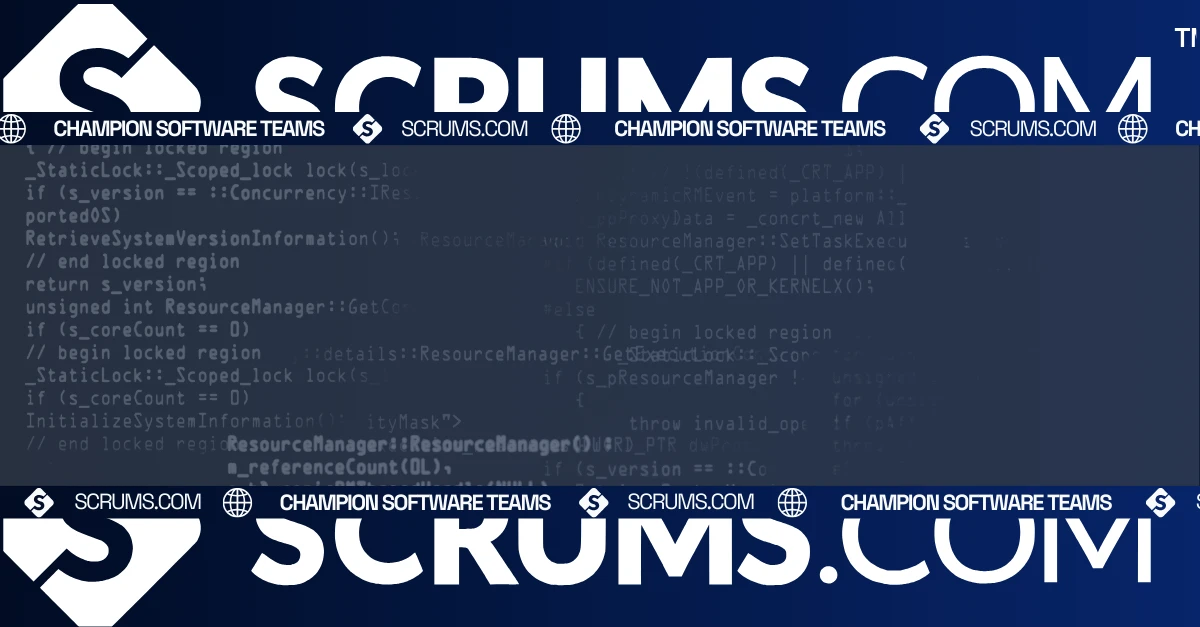Hire Ruby Software Developers
Scrums.com's 8,500+ software developer talent pool includes experts across a wide array of software development languages and technologies giving your business the ability to hire in as little as 21-days.
Trusted by 400+ global companies
















Ruby, an elegant and efficient programming language, is widely used for backend development in web applications and dynamic websites. Known for its simplicity, productivity, and readability, Ruby allows developers to build scalable and maintainable backend systems quickly. Hiring a skilled Ruby developer can help businesses create high-quality backend solutions that drive application performance and enhance user experience. Here’s why Ruby is a valuable technology for modern development, the benefits of hiring Ruby developers, and the key competencies they bring to backend projects.
What is Ruby, and Why It Matters for Your Business
Ruby is an open-source, high-level programming language designed for simplicity and productivity. Often used for backend development, Ruby powers applications with efficient data handling, flexible coding, and easy integration with web frameworks like Ruby on Rails. For businesses looking to streamline development and create robust web applications, hiring a Ruby developer ensures that backend solutions are reliable, scalable, and optimized for performance. Ruby is especially valued by startups and large enterprises alike for its flexibility and ability to accelerate the development cycle.
Key Benefits of Hiring a Ruby Developer for Backend Solutions
Hiring an experienced Ruby developer provides numerous advantages, especially for companies focused on building efficient and scalable web applications:
- Rapid Development: Ruby’s concise syntax and flexibility allow developers to write clean code quickly, reducing time-to-market and speeding up deployment.
- Scalable Backend Services: Ruby developers can design backend systems that scale efficiently with growing user demand, making it ideal for startups and expanding businesses.
- Easy Maintenance and Updates: Ruby’s readability and modularity make it easier for developers to maintain and update backend code over time, ensuring long-term application stability.
- Strong Ecosystem and Libraries: With a rich ecosystem of libraries (gems), Ruby developers can leverage pre-built components, accelerating development and ensuring robust functionality.
These benefits make hiring a Ruby developer a strategic choice for businesses seeking to build high-performance, easily maintainable backend solutions that support growth and user satisfaction.
Core Competencies of Skilled Ruby Developers
A skilled Ruby developer brings essential competencies that enhance backend performance, security, and scalability. Key competencies to look for include:
- Proficiency in Ruby and Ruby on Rails: Skilled Ruby developers should have strong expertise in the Ruby language, as well as experience with the Ruby on Rails framework for building efficient and scalable web applications.
- Knowledge of Database Management: Ruby developers should understand database structures, including SQL and NoSQL databases, to manage data flow and optimize storage for large-scale applications.
- Experience in API Development: Proficiency in building and maintaining RESTful APIs is essential for Ruby developers, as it allows them to create scalable and secure backend services for frontend applications.
- Focus on Security and Performance Optimization: Ruby developers should be skilled in secure coding practices and performance optimization to ensure that backend systems are reliable and resilient to heavy loads.
These core competencies ensure that Ruby developers can deliver robust, high-quality backend services that are easy to maintain, secure, and ready to scale as needed.
Applications of Ruby in Modern Backend Development
Ruby’s versatility and efficiency make it a popular choice for a variety of backend applications, particularly those that require scalability and rapid development. Common applications of Ruby include:
- Web Application Development: Ruby, particularly with the Ruby on Rails framework, is widely used for developing dynamic web applications, from e-commerce platforms to social media sites.
- API Development and Microservices: Ruby developers often build APIs and microservices that enable seamless data exchange between frontend and backend systems, ideal for businesses focused on creating scalable and modular applications.
- Data-Driven Applications: With robust database integration, Ruby is a preferred choice for data-driven applications, where managing and processing large datasets efficiently is essential.
- Scalable SaaS Platforms: Ruby’s scalability and modularity make it ideal for building Software-as-a-Service (SaaS) platforms, supporting businesses with secure, performance-oriented backend systems.
These applications demonstrate Ruby’s flexibility, enabling businesses to deploy powerful, high-performance backend solutions across diverse digital platforms.
Ruby vs. Other Backend Languages: Why Choose Ruby?
When comparing Ruby to other backend languages, it stands out for its emphasis on developer productivity, readability, and rapid development. Here’s how it compares:
- Ruby vs. Python: While Python is versatile and often used in data science, Ruby offers faster web development, particularly with Rails, making it a better choice for rapid deployment of web applications.
- Ruby vs. Java: Java is well-suited for enterprise-level applications, but Ruby’s simplicity and ease of use allow for quicker development, ideal for startups and small to mid-sized projects.
- Ruby vs. PHP: PHP is commonly used for web development, but Ruby provides more structure and modularity, which enhances maintainability and scalability for larger projects.
Ruby’s strengths make it a top choice for companies looking to balance speed, scalability, and ease of maintenance in their backend development projects.
The Future of Ruby Development: Trends and Insights
Ruby continues to be a relevant language in backend development, with ongoing trends that underscore its importance. Key trends influencing Ruby development include:
- Growing Demand for Scalable Backend Solutions: As businesses expand, there is an increasing need for scalable backend solutions, and Ruby’s ability to support growth with efficient code and modular architecture aligns well with this trend.
- Focus on API-Driven Applications: With API-driven applications on the rise, Ruby developers skilled in API design and microservices will be increasingly sought after, especially for mobile-first and multi-device applications.
- Advancements in Security and Performance: As web applications continue to evolve, Ruby’s community is consistently improving security and performance capabilities, ensuring that the language remains viable for high-demand applications.
These trends demonstrate that Ruby is likely to remain a strong choice for backend development, especially as demand for flexible, scalable solutions grows.
How to Hire the Right Ruby Developer for Your Project
Hiring a qualified Ruby developer is crucial for ensuring the success of your project. Here’s what to consider:
- Proven Experience in Ruby and Ruby on Rails: Look for developers with experience in both Ruby and Ruby on Rails to ensure they can build efficient, scalable backend solutions.
- Database Management Skills: Ruby developers should be skilled in database management, particularly with SQL and NoSQL databases, to support data-heavy applications.
- API Development and Integration Expertise: For businesses needing API-driven applications, choose Ruby developers with a background in creating and maintaining RESTful APIs.
- Focus on Secure and Scalable Design: Choose developers who prioritize secure coding practices and scalability to ensure that your backend systems are reliable and prepared for future growth.
Hiring a Ruby developer provides businesses with the expertise needed to create scalable, secure, and high-performance backend systems. With skills in Ruby, Ruby on Rails, and database management, Ruby developers bring the ability to build applications that are both powerful and easy to maintain. Whether you need a dynamic web application, a scalable API, or a data-driven backend system, a dedicated Ruby developer can help you achieve a high-quality, robust solution that meets the demands of modern web development.
Don't Just Take Our Word for It
Hear from some of our amazing customers who are building with Scrums.com Teams.
Find Related Software Developer Technologies
Ruby on Rails developers
Apache Kafka developers
Nuxt.js developers
Framework 7 developers
Kohana developers
Dart developers
Grails developers
Node.js developers
XML developers
NestJS developers
Object Pascal developers
How to Hire Software Developers with Scrums.com
Align
Let us get to know your business. Book a free consultation and tell us about your tech talent requirements.
Review
Our teams will look at the current culture and requirements of your business and match quality tech talent that best suite your teams.
Meet
Meet your tech talent. We have a 33% acceptance rate as we pre-qualify suitable talent to ensure they meet your needs.
Kick-Off
Once we have agreed on the best way forward, we will start the contract closure process. Once that's done - We can kick-off!
Explore Software Development Blogs
The most recent trends and insights to expand your software development knowledge.










